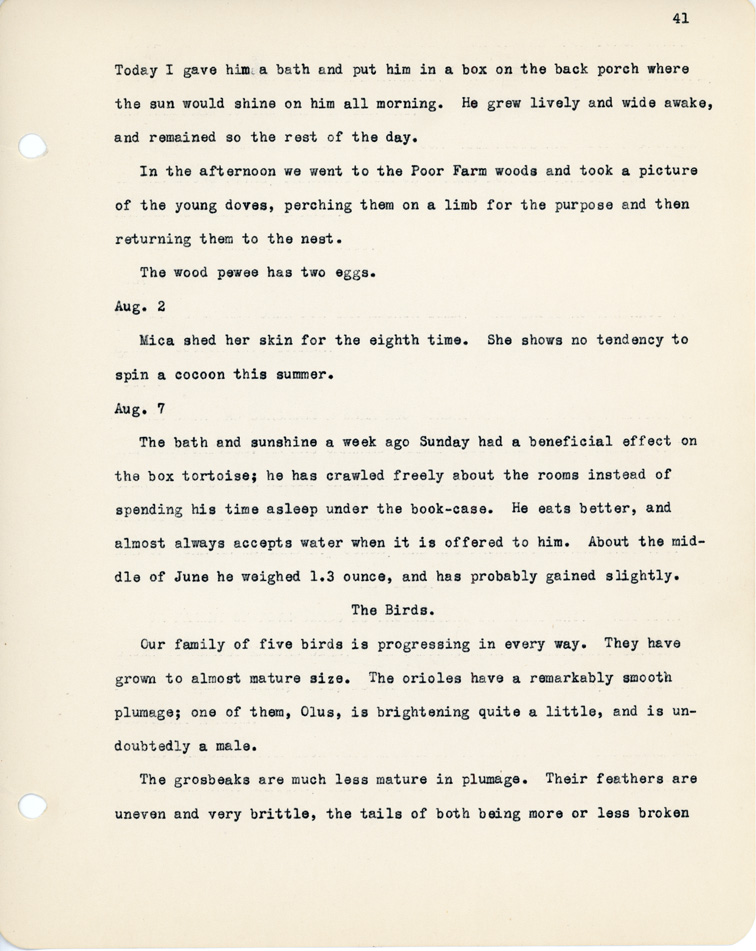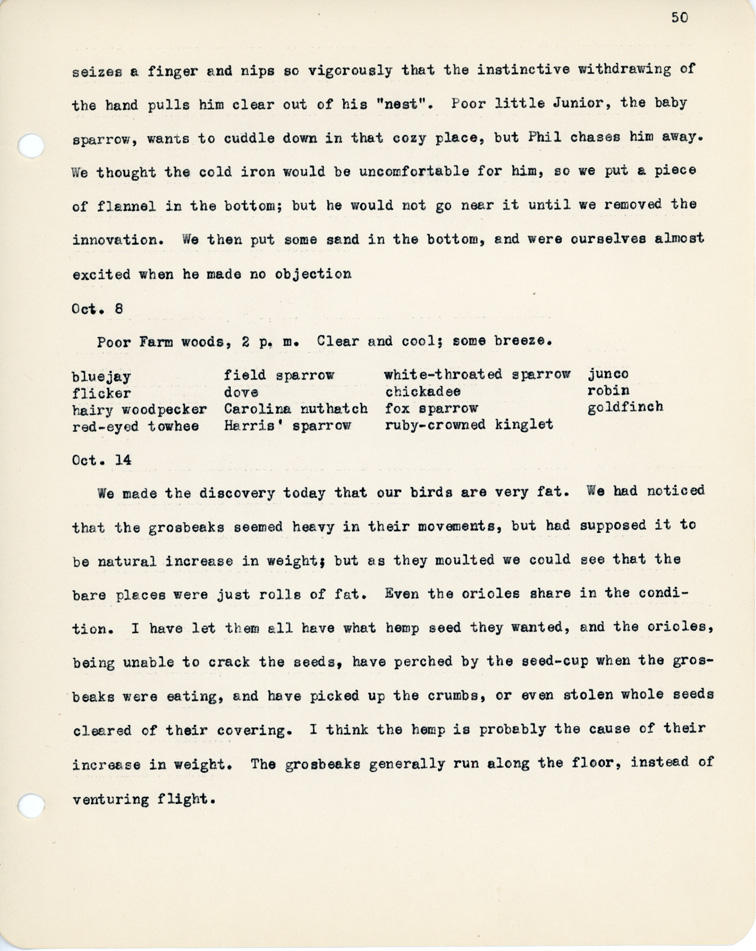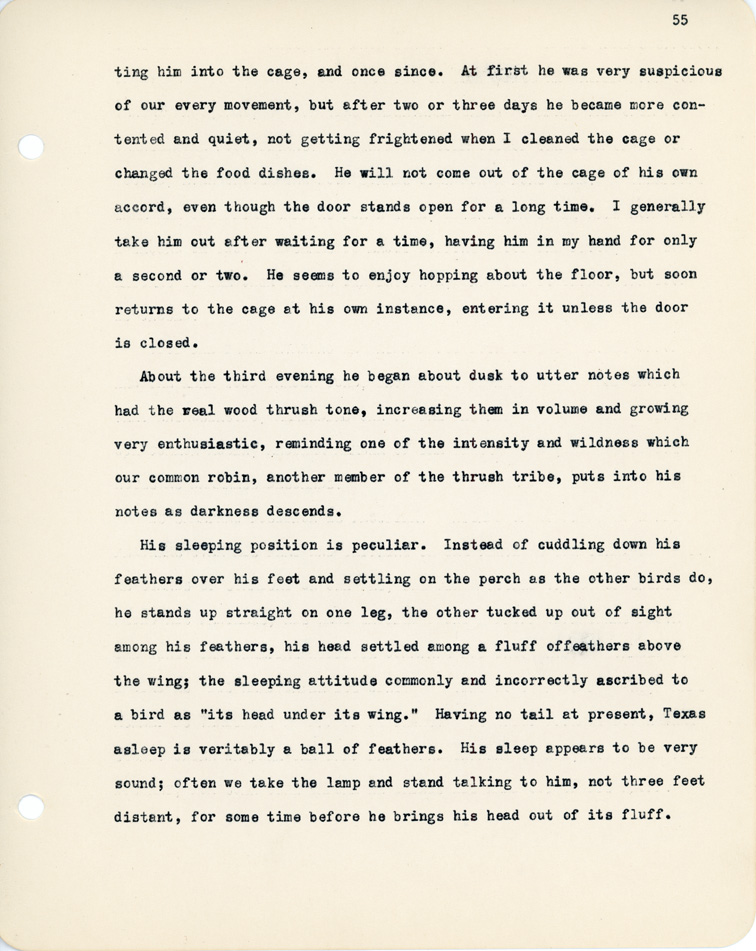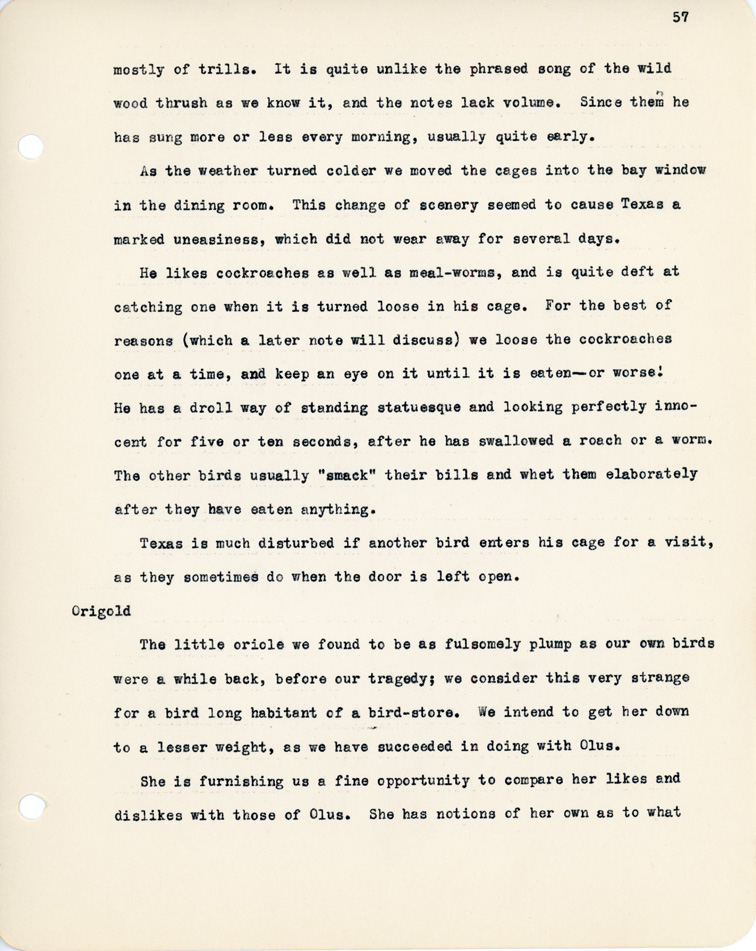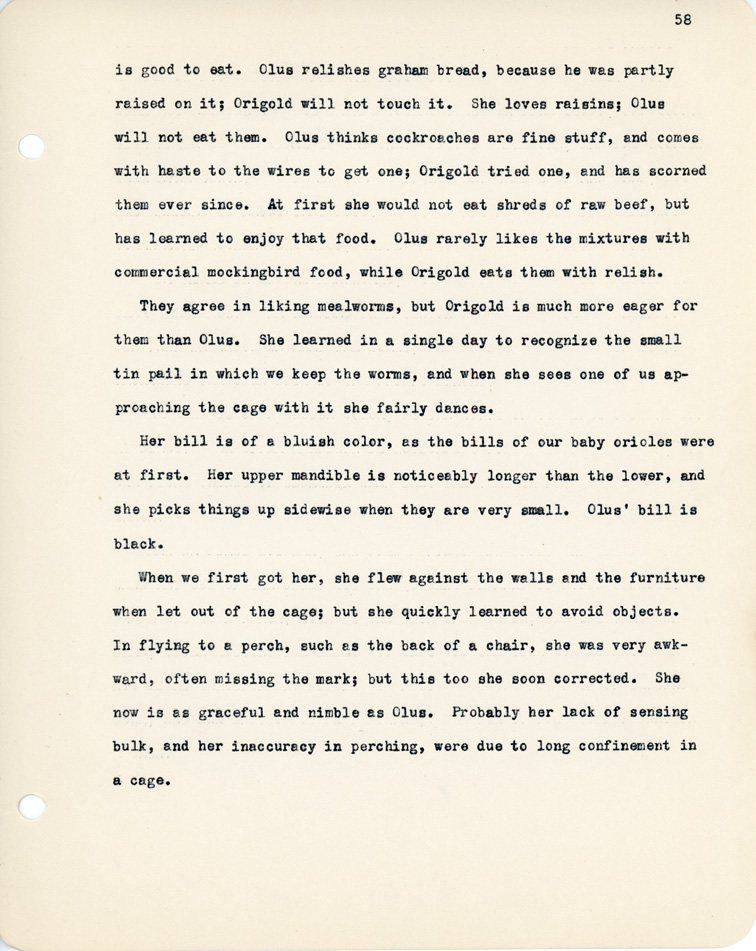Great Nebraska
Naturalists and Scientists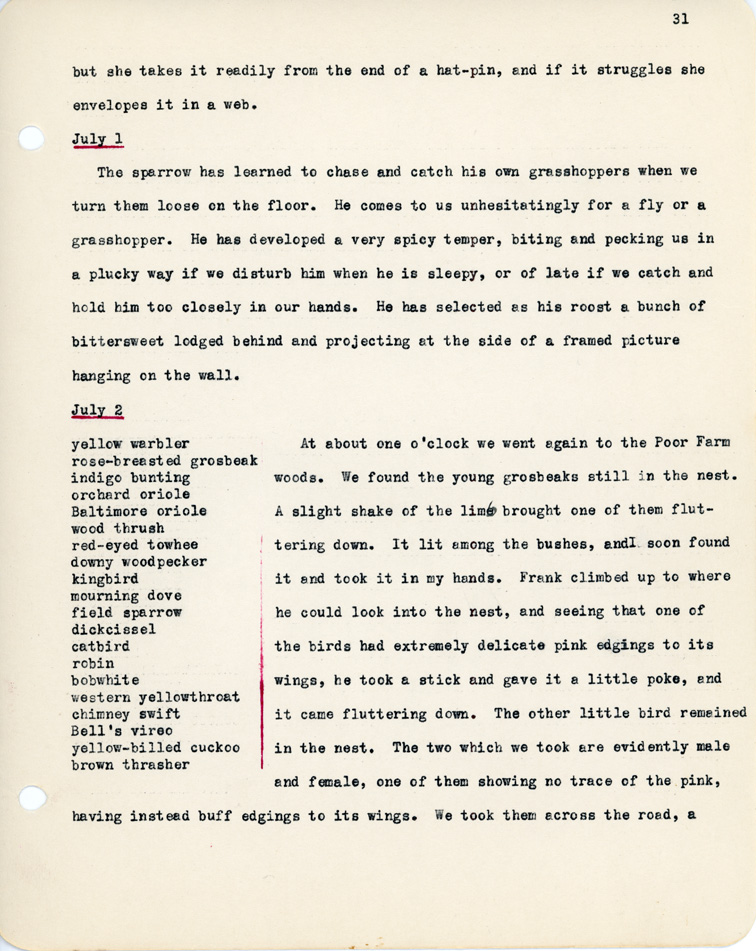
but she takes it readily from the end of a hat-pin, and if it struggles she envelopes it in a web.
July 1
The sparrow has learned to chase and catch his own grasshoppers when we turn them loose on the floor. He comes to us unhesitatingly for a fly or a grasshopper. He has developed a very spicy temper, biting and pecking us in a plucky way if we disturb him when he is sleepy, or of late if we catch and hold him too closely to our hands. He has selected as his roost a bunch of bittersweet lodged behind and projecting at the side of a framed picture hanging on the wall.
July 2
yellow warbler
rose-breasted grosbeak
indigo bunting
orchard oriole
wood thrush
red-eyed towhee
downy woodpecker
kingbird
mourning dove
field sparrow
dickcissel
catbird
robin
bobwhite
western yellowthroat
chimney swift
Bell’s vireo
yellow-billed cuckoo
brown thrasher
At about one o’clock we went again to the Poor Farm woods. We found the young grosbeaks still in the nest. A slight shake of the limb brought one of them fluttering down. It lit among the bushes, andI[sic] soon found it and took it in my hands. Frank climbed up to where he could look into the nest, and seeing that one of the birds had extremely delicate pink edgings to its wings, he took a stick and gave it a little poke, and it came fluttering down. The other little bird remained in the nest. The two which we took are evidently male and female, one of them showing no trace of the pink, having instead buff edgings to its wings. We took them across the road, a
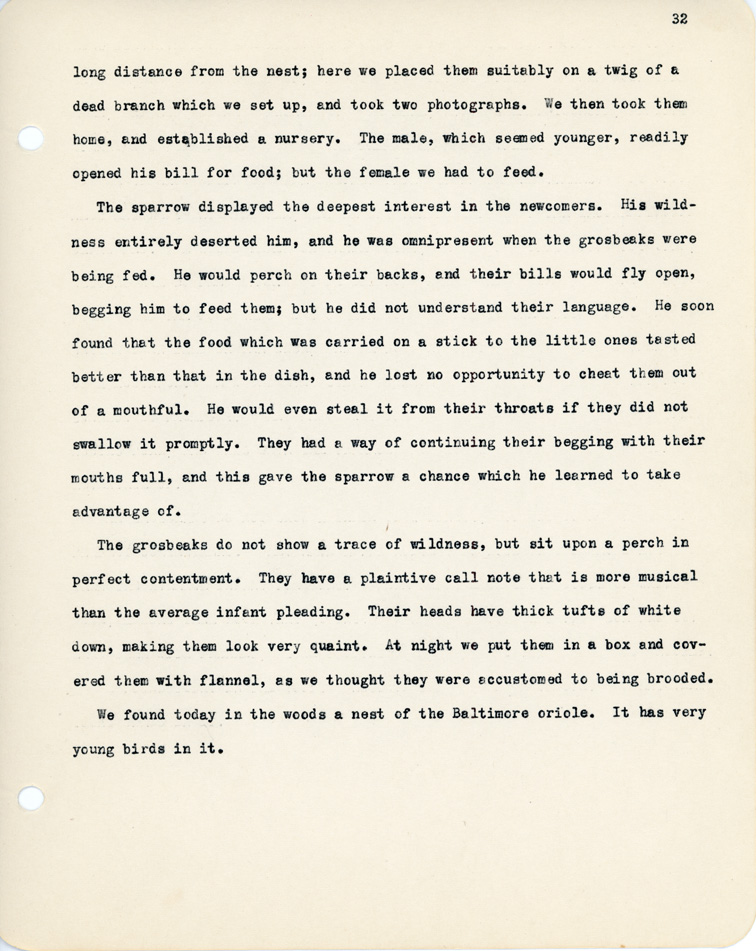
Long distance from the nest; here we placed them suitably on a twig of a dead branch which we set up, and took two photographs. We then took them home, and established a nursery. The male, which seemed younger, readily opened his bill for food; but the female we had to feed.
The sparrow displayed the deepest interest in the newcomers. His wildness entirely deserted him, and he was omnipresent when the grosbeaks were being fed. He would perch on their backs, and their bills would fly open, begging him to feed them; but he did not understand their language. He soon found that the food which was carried on a stick to the little ones tasted better than that in the dish, and he lost no opportunity to cheat them out of a mouthful. He would even steal it from their throats if they did not swallow it promptly. They had a way of continuing their begging with their mouths full, and this gave the sparrow a chance which he learned to take advantage of.
The grosbeaks do not show a trace of wildness, but sit upon a perch in perfect contentment. They have plaintive call note that is more musical than the average infant pleading. Their heads have thick tufts of white down, making them look very quaint. At night we put them in a box and covered them with flannel, as we thought they were accustomed to being brooded. We found today in the woods a nest of Baltimore oriole. It has very young birds in it.
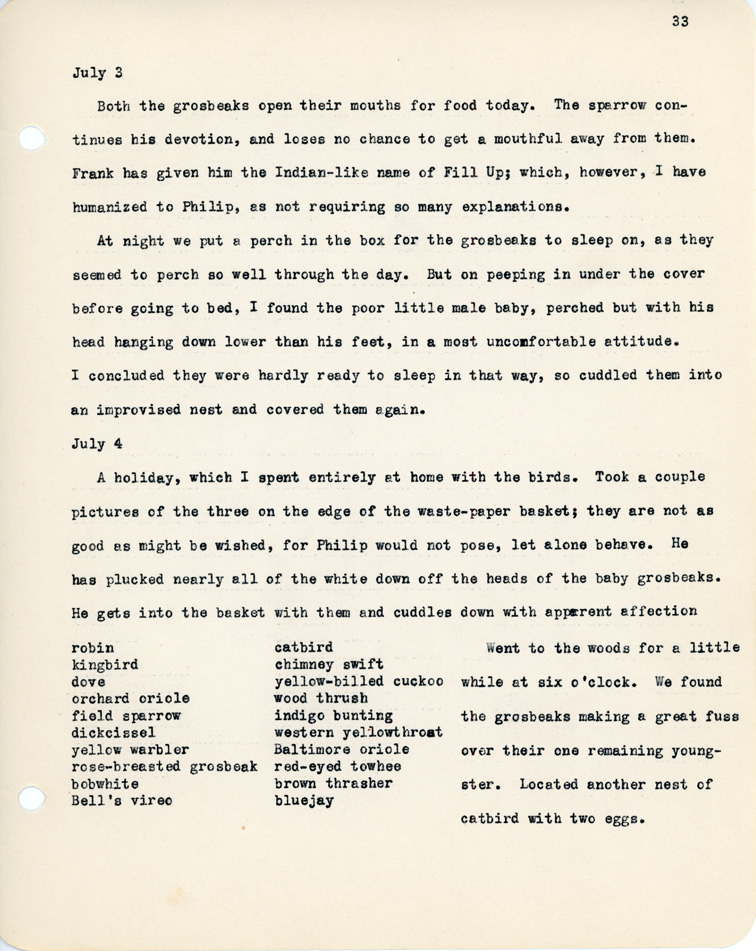
July 3
Both the grosbeaks open their mouths for food today. The sparrow continues his devotion, and loses no chance to get a mouthful away from them. Frank has given him the Indian-like name of Fill Up; which, however, I have humanized to Philip, as not requiring so many explanations.
At night we put a perch in the box for the grosbeaks to sleep on, as they seemed to perch so well through the day. But on peeping in under the cover before going to bed, I found the poor little male baby, perched but with his head hanging down lower than his feet, in a most uncomfortable attitude. I concluded they were hardly ready to sleep in that way, so cuddled them into an improvised nest and covered them again.
July 4
A holiday, which I spent entirely at home with the birds. Took a couple pictures of the three on the edge of the waste-paper basket; they are not as good as might be wished, for Philip would not pose, let alone behave. He has plucked nearly all of the white down off the heads of the baby grosbeaks. He gets into the basket with them and cuddles down with apparent affection.
robin catbird
kingbird chimney swift
dove yellow-billed cuckoo
orchard oriole wood thrush
field sparrow indigo bunting
dickcissel western yellowthroat
yellow warbler Baltimore oriole
rose-breasted grosbeak red-eyed towhee
bobwhite brown thrasher
Bell’s vireo bluejay
Went to the woods for a little while at six o’clock. We found the grosbeaks making a great fuss over their one remaining youngster. Located another nest of catbird with two eggs.
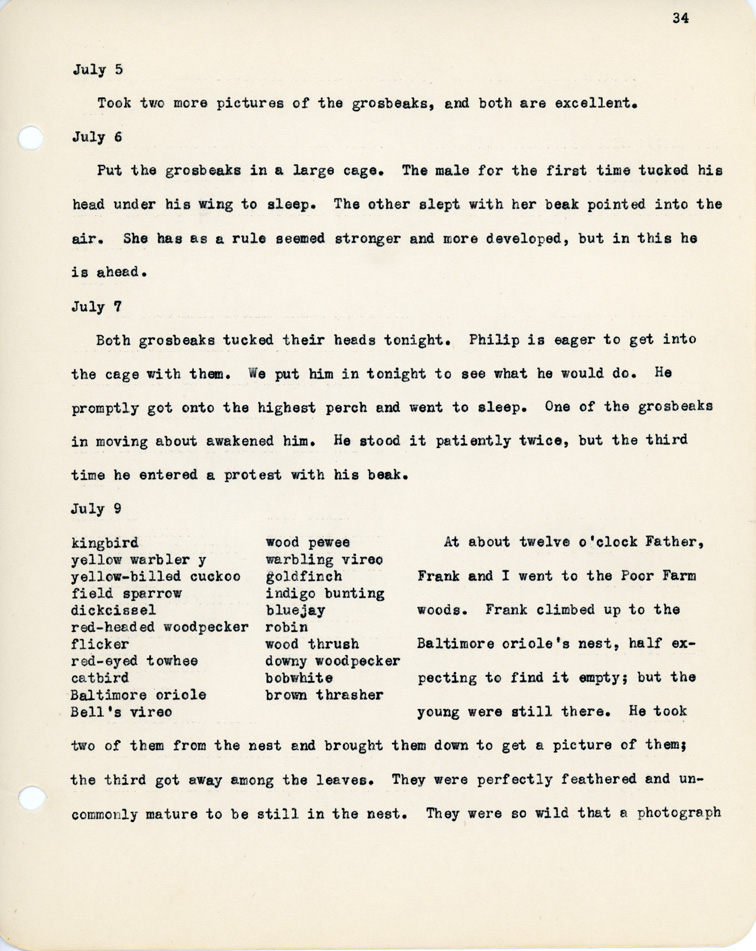
July 5
Took two more pictures of the grosbeaks, and both are excellent.
July 6
Put the grosbeaks in a large cage. The male for the first time tucked his head under his wing to sleep. The other slept with her beak pointed into the air. She has as a rule seemed stronger and more developed, but in this he is ahead.
July 7
Both grosbeaks tucked their heads tonight. Philip is eager to get into the cage with them. We put him in tonight to see what he would do. He promptly got onto the highest perch and went to sleep. One of the grosbeaks in moving about awakened him. He stood it patiently twice, but the third time he entered a protest with his beak.
July 9
kingbird wood pewee
yellow warblery warbling vireo
yellow-billed cuckoo goldfinch
field sparrow indigo bunting
dickcissel bluejay
red-headed woodpecker robin
flicker wood thrush
red-eyed towhee downy woodpecker
catbird bobwhite
Baltimoreoriole brown thrasher
Bell’s vireo
At about twelve o’clock Father, Frank and I went to the Poor Farm woods. Frank climbed up to the Baltimore oriole nest, half expecting to find it empty; but the young were still there. He two of them from the nest and brought them down to get a picture of them; the third got away among the leaves. They were perfectly feathered and uncommonly mature to be still in the nest. They were so wild that a photograph
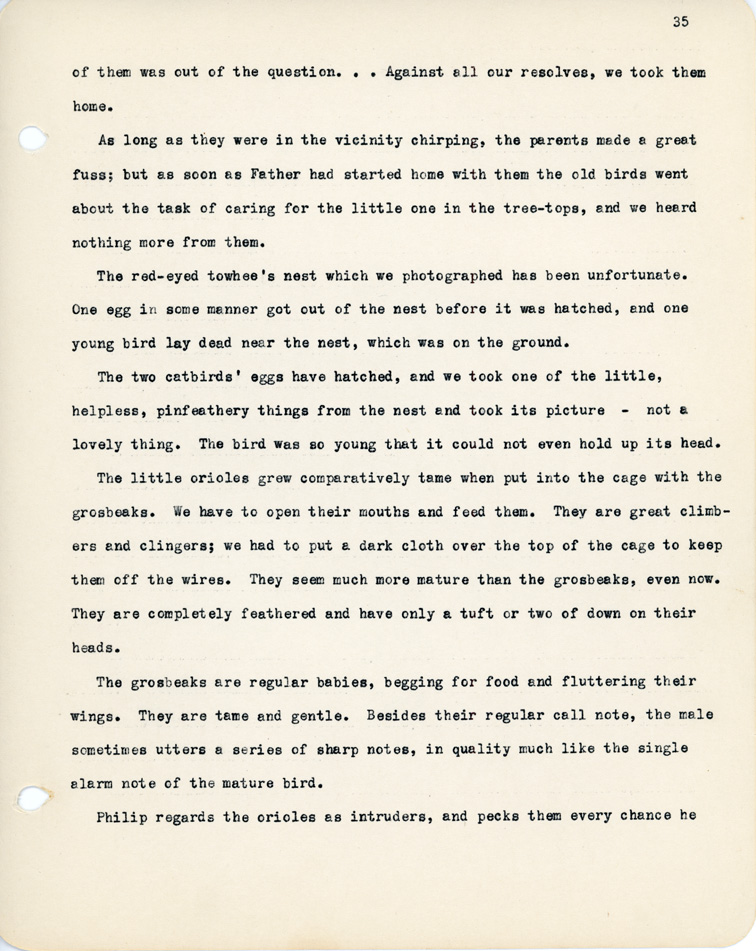
of them was out of the question. . . Against all our resolves, we took them home.
As long as they were in the vicinity chirping, the parents made a great fuss; but as soon s Father had started home with them the old birds went about the task of caring for the little one in the tree-tops, and we heard nothing more from them.
The red-eyed towhee’s nest which we photographed has been unfortunate. One egg in some manner got out of the nest before it was hatched, and one young bird lay dead near the nest, which was on the ground.
The two catbirds’ eggs have hatched, and we took one of the little helpless, pinfeathery things from the nest and took its picture – not a lovely thing. The bird was so young that it could not even hold up its head.
The little orioles grew comparatively tame when put into the cage with the grosbeaks. We have to open their mouths and feed them. They are great climbers and clingers; we had to put a dark cloth over the top of the cage to keep them off the wires. They seem much more mature than the grosbeaks, even now. They are completely feathered and have only a tuft or two of down on their heads.
The grosbeaks are regular babies, begging for food and fluttering their wings. They are tame and gentle. Besides their regular call note, the male sometimes utters a series of sharp notes, in quality much like the single alarm note of the mature bird.
Philip regards the orioles as intruders, and pecks them every chance he

gets. Perhaps it is because they are so much more active than the grosbeaks, and he thinks they mean to be aggressive.
Phil’s pugnacity when we awaken him after he has gone to sleep on his bunch of bittersweet is something comical. He ruffles his feathers, pecks vigorously, and if he can get hold of a finger bites with all his might. He has not notion of flying away when we disturb him, but stands his ground and fights until we leave vanquished.
July 10
The early hours of the morning were devoted to taking pictures of our feathered pets. Took one of the orioles alone, one of the orioles and grosbeaks, one of the female grosbeak, and one of the five together. All the photos were successful.
July 11
This noon while giving Philip a drink at the faucet, he showed signs of fluttering his wings for a bath, so I held him in the running water for a moment, drenching him more than I had intended. He was a sorry looking object, but was glorious in his indignation. He punished me severely as he knew how, sitting upon my finger and pecking me, getting a good hold and biting, and in every way he could showing his anger. I tried to dry him and warm him between my hands, but he continued pecking and pinching. He did not even care for his liberty, but stood upon my open palm and kept on fighting.
I had brought home from Kansas a little box tortoise, and 2 ½ inches long.
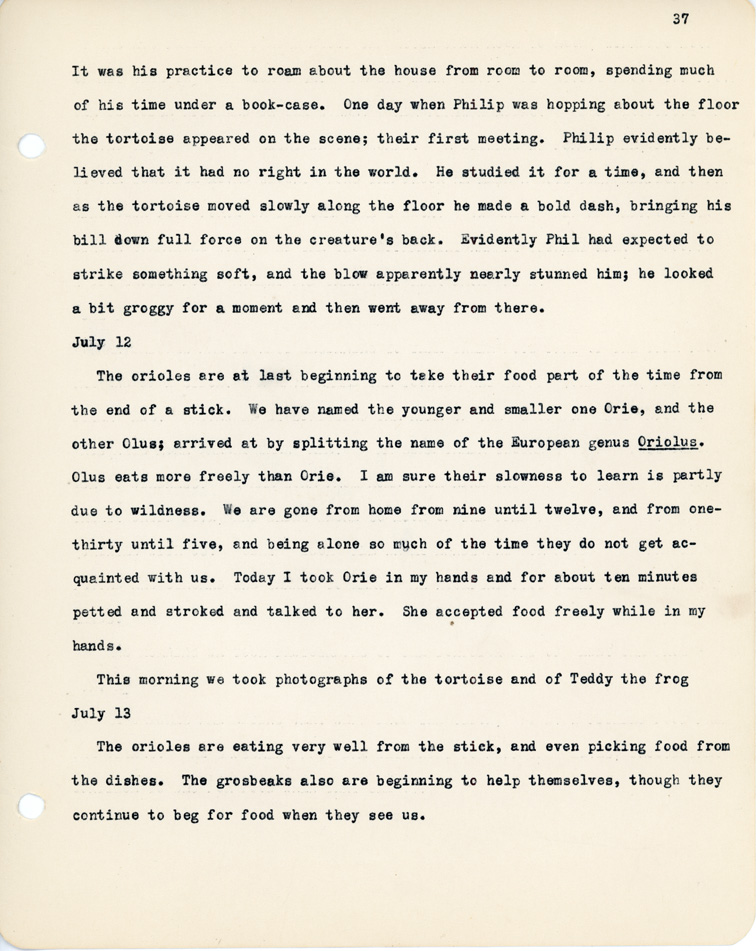
It was his practice to roam about the house from room to room, spending much of his time under a book-case. One day when Philip was hopping about the floor the tortoise appeared on the scene; their first meeting. Philip evidently believed that it had no right in the world. He studied it for a time, and then as the moved slowly along the floor he made a bold dash, bringing his bill down full force on the creature’s back. Evidently Phil had epected to strike something soft, and the blow apparently nearly stunned him; he looked a bit groggy for a moment and then went away from there.
July 12
The orioles are at last beginning to take their food part of the time from the end of a stick. We have named the younger and smaller on Orie, and the other Olus; arrived at by splitting the name of the European genus Oriolus. Olus eats more freely than Orie. I am sure their slowness to learn is partly due to wildness. We are gone from home from nine until twelve, and from one-thirty until five, and being alone so much of the time they do not get acquainted with us. Today I took Orie in my hands and for about ten minutes petted ad stroked and talked to her. She accepted food freely while in my hands.
This morning we took photographs of the tortoise and of Teddy the frog
July 13
The orioles are eating very well from the stick, and even picking food from the dishes. The grosbeaks also are beginning to help themselves, though they continue to beg for food when they see us.
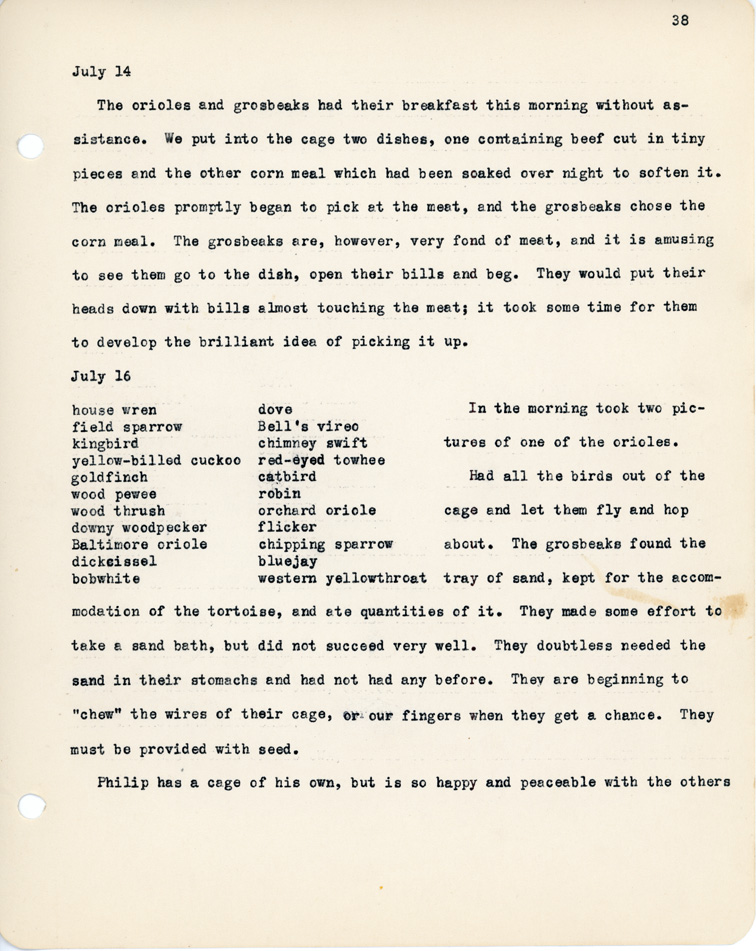
July 14
The orioles and grosbeaks had their breakfast this morning without assistance. We put into the cage two dishes, one containing beef cut in tiny pieces and the other corn meal which had been soaked over night to soften it. The orioles promptly began to pick at the meat, and the grosbeaks chose the corn meal. The grosbeaks are, however, very fond of meat, and it is amusing to see them go to the dish, open their bills and beg. They would put their heads down with bills almost touching the meat; it took some time for them to develop the brilliant idea of picking it up.
July 16
house wren dove
field sparrow Bell’s vireo
kingbird chimney swift
yellow-billed cuckoo red-eyed towhee
goldfinch catbird
wood pewee robin
wood thrush orchard oriole
downy woodpecker flicker
Baltimore oriole chipping sparrow
dickcissel bluejay
bobwhite western yellowthroat
In the morning took two pictures of one of the orioles.
Had all the birds out of the cage and let them fly and hop about. The grosbeaks found the tray of sand, kept for the accommodation of the tortoise, and ate quantities of it. They made some effort to take a sand bath, but did not succeed very well. They doubtless needed the sand in their stomachs and had not any before. They are beginning to “chew” the wires of their cage, or our fingers when they get a chance. They must be provided with seed.
Philip has a cage of his own, but is so happy and peaceable with the others
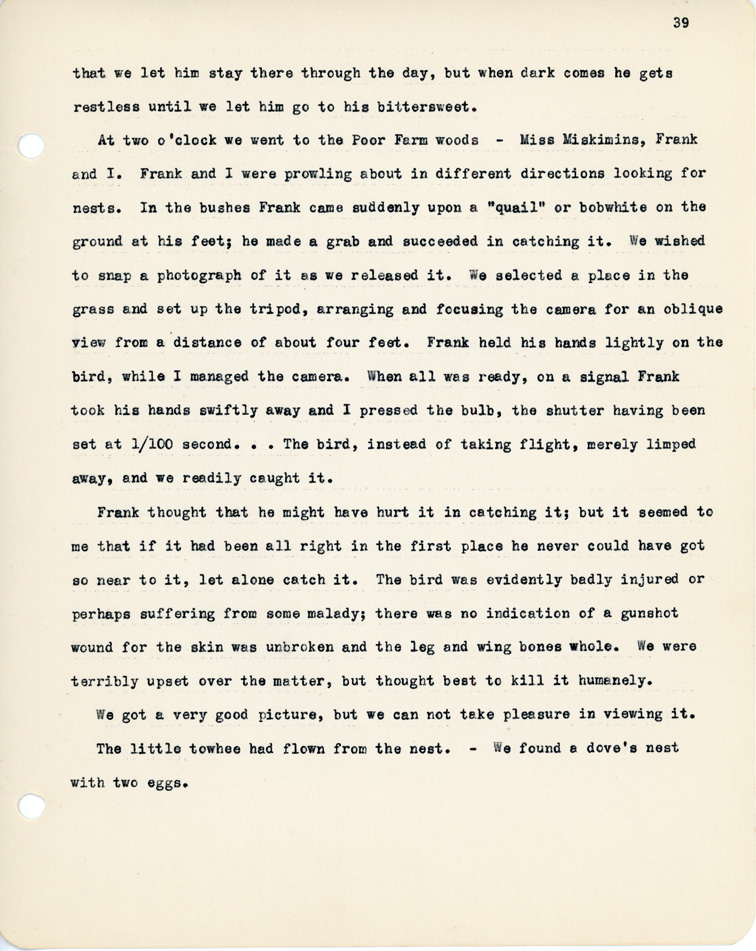
that we let him stay there through the day, but when dark comes he gets restless until we let him go to his bittersweet.
At two o’clock we went to the Poor Farm woods – Miss Miskimins Frank and I. Frank and I were prowling about in different directions looking for nest. In the bushes Frank came suddenly upon a “quail” or bobwhite on the ground at his feet; he made a grab and succeeded in catching it. We wished to snap a photograph of it as we released it. We selected a place in the grass and set up the tripod, arranging and focusing the camera for an oblique view from a distance of about four feet. Frank held his hands lightly on the bird, while I managed the camera. When all was ready, on a signal Frank took his hands swiftly away and I pressed the bulb, the shutter having been set at 1/100 second. . . . The bird, instead of taking flight, merely limped away, and we readily caught it.
Frank though the he might have hurt it in catching it; but it seemed to me that if it had been all right in the first place he never could have got so near to it, let alone catch it. The bird was evidently badly injured or perhaps suffering from malady; there was no indication of a gunshot would for the skin was unbroken and the leg and wing bones whole. We were terribly upset over the matter, but thought best to kill it humanely.
We got a very good picture, but we can not take pleasure in viewing it.
The little towhee had flown from the nest. – We found a dove’s nest with two eggs.

July 22
Our little birds are growing rapidly; their tails have lengthened considerably. The grosbeaks today made the first effort we have heard to warble. It was not much like the grosbeak song to which we are accustomed, though the notes were soft and sweet.
July 23
One of the orioles gave a call quite like that of the mature bird. We hope this indicates that we have a male.
The birds have learned to bathe, taking a morning bath almost daily frequently one in the evening.
bobwhite Baltimore oriole
dickcissel red-eyed towhee
yellow warbler brown thrasher
Bell’s vireo goldfinch
yellow-billed cuckoo robin
wood thrush red-headed woodpecker
downy woodpecker western yellowthroat
catbird chimney swift
flicker bluejay
wood pewee rose-breasted grosbeak
dove
At about four o’clockFrank[sic] and I went to the Poor Farm woods. The day was very warm in the city, but fairly comfortable in the woods.
A nest of dove – two eggs.
In a part of the wood which we seldom explore, a nest of dove with very young birds.
Across the road from where the nest of wood pewee was destroyed there is another nest, about completed, probably built by the same pair.
July 30
The little box tortoise has seemed for two or three weeks to be in a sort of stupor, awakening with difficulty. He drinks freely, but eats little.
Today I gave him a bath and put him in a box on the back porch where the sun would shine on him all morning. He grew lively and wide awake, and remained so the rest of the day.
In the afternoon we went to the Poor Farm woods and took a picture of the young doves, perching them on a limb for the purpose and then returning them to the nest.
The wood pewee has two eggs.
Aug. 2
Mica shed her skin for the eighth time. She shows no tendency to spin a cocoon this summer.
Aug. 7
The bath and sunshine a week ago Sunday had a beneficial effect on the box tortoise; he has crawled freely about the rooms instead of spending his time asleep under the book-case. He eats better, and almost always accepts water when it is offered to him. About the middle of June he weighed 1.3 once, and has probably gained slightly.
The Birds.
Our family of five birds is progressing in every way. They have grown to almost mature size. The orioles have a remarkably smooth plumage; one of them, Olus, is brightening quite a little, and Is undoubtedly a male.
The grosbeaks are much less mature in plumage. Their feathers are uneven and very brittle, the tails of both being more or less broken
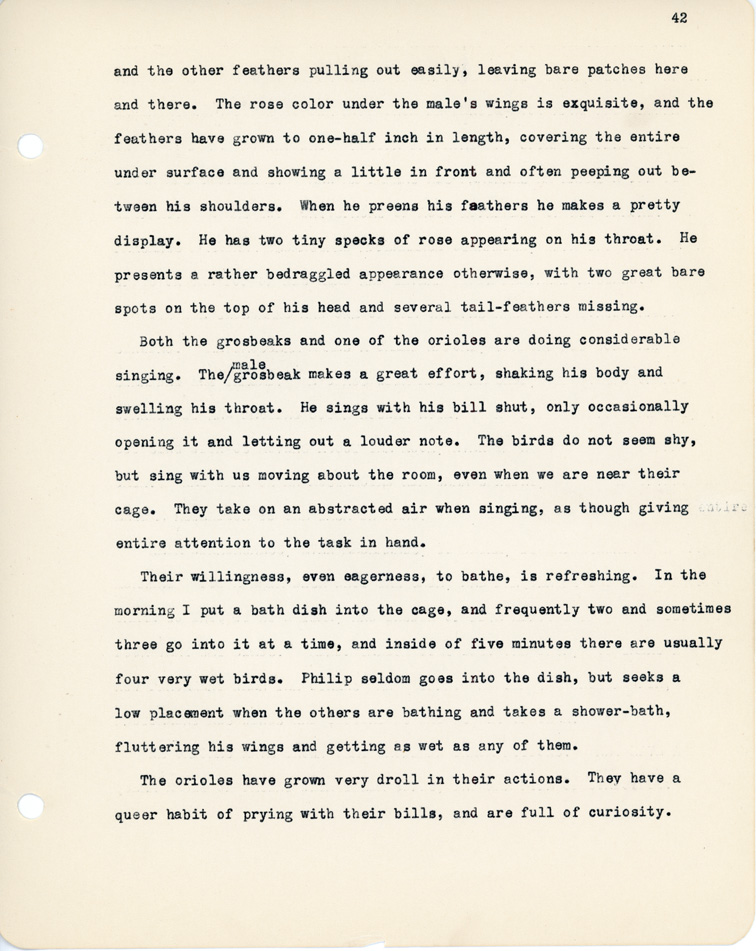
and the other feathers pulling out easily, leaving bare patches here and there. The rose color under the male’s wings is exquisite, and the feathers have grown to one-half inch in length, covering the entire under surface and showing a little in front and often peeping out between his shoulders. When he preens his feathers he makes a pretty display. He has two tiny specks of rose appearing on his throat. He presents a rather bedraggled appearance otherwise, with two great bare spots on the top of his head and several tail-feathers missing.
Both the grosbeaks and one of the orioles are doing considerable singing. The/male grosbeak makes a great effort, shaking his body and swelling his throat. He sings with his bill shut, only occasionally opening it and letting out a louder note. The birds do not seem shy, but sing with us moving about the room, even when we are near their cage. They take on an abstracted air when singing, as though giving entire attention to the task in hand.
Their willingness, even eagerness, to bathe, is refreshing. In the morning I put a bath dish into the cage, and frequently two and sometimes three go into it at a time, and inside of five minutes there are usually four very wet birds. Philip seldom goes into the dish, but seeks a low placement when the others are bathing and takes a shower-bath, fluttering his wings and getting as wet as any of them.
The orioles have grown very droll in their actions. They have a queer habit of prying with their bills, and are full of curiosity.
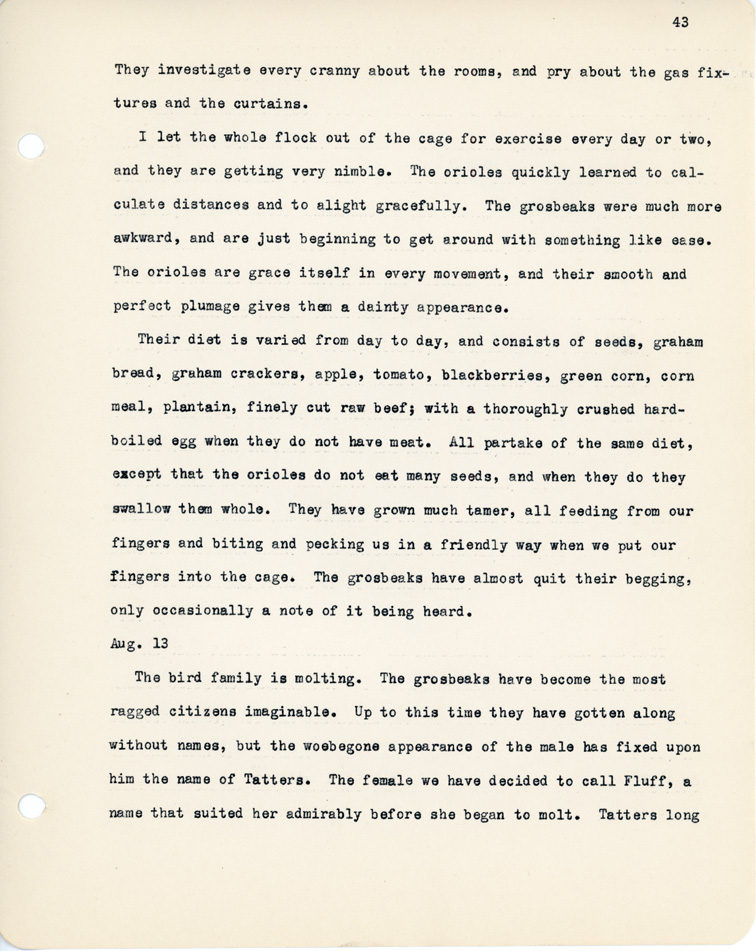
They investigate every cranny about the rooms, and pry about the gas fixtures and the curtains.
I let the whole flock out of the cage for exercise every day or two, and they are getting very nimble. The orioles quickly learned to calculate distances and to alight gracefully. The grosbeaks were much more awkward, and are just beginning to get around with something like ease. The orioles are grace itself in every movement, and their smooth and perfect plumage gives them a dainty appearance.
Their diet is varied from day to day, and consists of seeds, graham bread, graham crackers, apple, tomato, blackberries, green corn, corn meal, plantain, finely cut raw beef; with a thoroughly crushed hard-boiled egg when they do not have meat. All partake of the same diet, except that the orioles do not eat many seeds, and when they do they swallow them whole. They have grown much tamer, all feeding from our fingers and biting and pecking us in a friendly way when we put our fingers into the cage. The grosbeaks have almost quit their begging. Only occasionally a note of it being heard.
Aug. 13
The bird family is molting. The grosbeaks have become the most ragged citizens imaginable. Up to this time they have gotten along without names, but the woebegone appearance of the male has fixed upon him the name of Tatters. The female we have decided to call Fluff, a name that suited her admirably before she began to molt. Tatters long
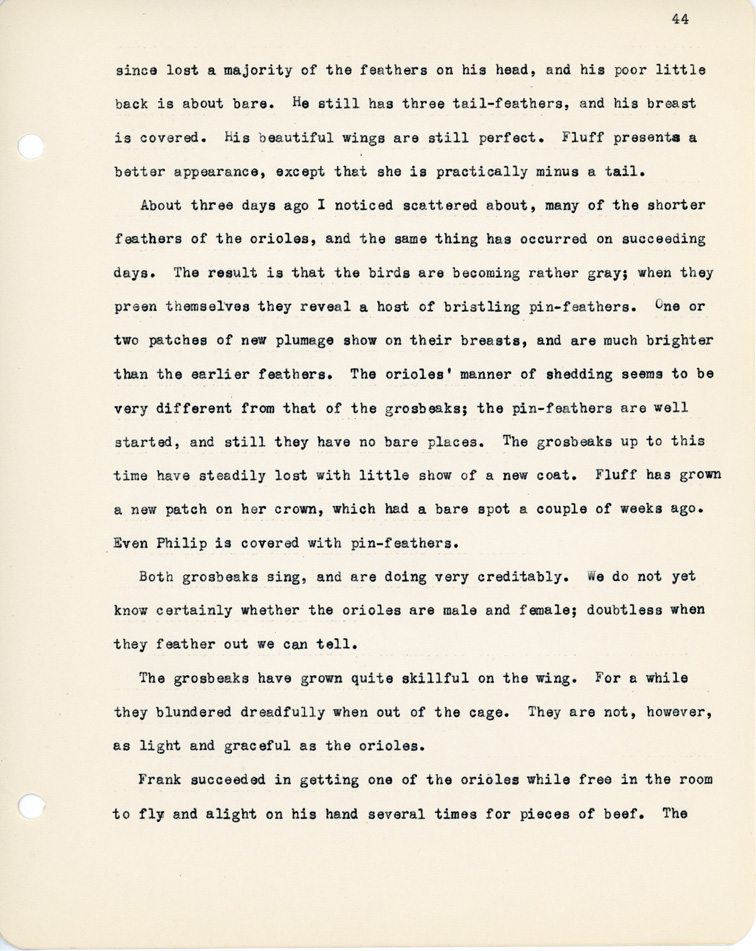
since lost a majority of the feathers on his head, and his poor little back is about bare. He still has three tail-feathers, and his breast is covered. His beautiful wings are still perfect. Fluff presents a better appearance, except that she is practically minus a tail.
About three days ago I noticed scattered about, many of the shorter feathers of the orioles, and the same thing has occurred on succeeding days. The result is that the birds are becoming rather gray; when they preen themselves they reveal a host of bristling pin-feathers. One or two patches of new plumage show on their breasts, and are much brighter than the earlier feathers. The orioles’ manner of shedding seems to be very different from that of the grosbeaks; the pin-feathers are well started, and still they have no bare places. The grosbeaks up to this time have steadily lost with little show of a new coat. Fluff has grown a new patch on her crown, which had a bare spot a couple of weeks ago. Even Philip is covered in pin-feathers.
Both grosbeaks sing, and are doing very creditably. We do not yet know certainly whether the orioles are male and female; doubtless when they feather out we can tell.
The grosbeaks have gown quite skillful on the wing. For a while they blundered dreadfully when out of the cage. They are not, however, as light and graceful as the orioles.
Frank succeeded in getting one of the orioles while free in the room to fly and alight on his hand several times for pieces of beef. The
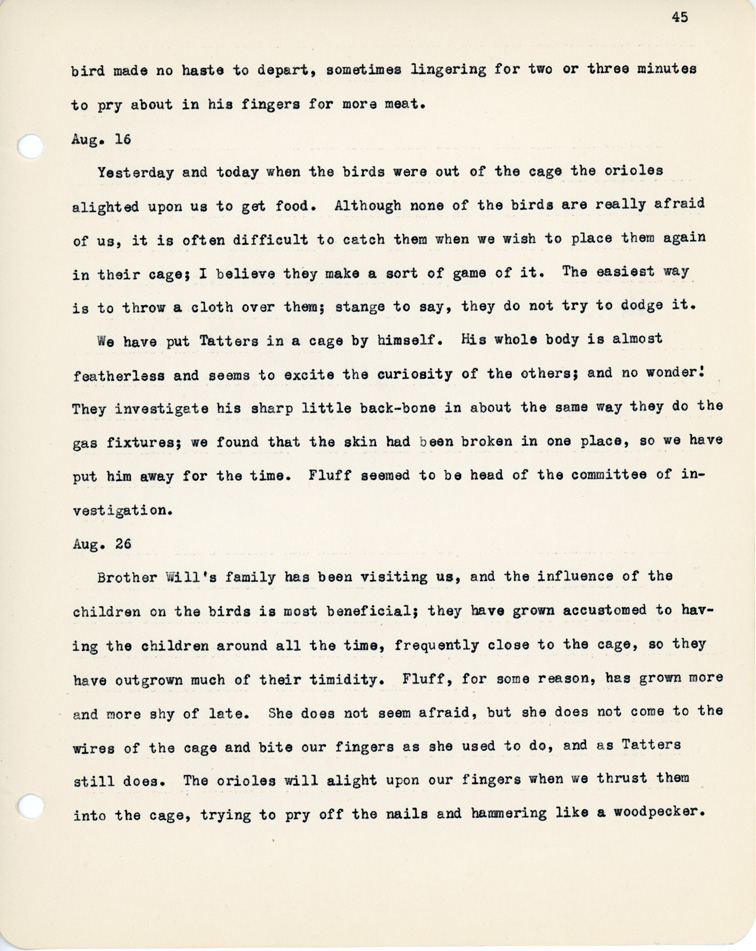
bird made no haste to depart, sometimes lingering for two or three minutes to pry about in his fingers for more meat.
Aug. 16
Yesterday and today when the birds were out of the cage the orioles alighted upon us to get food. Although none of the birds are really afraid of us, it is often difficult to catch them when we wish to place them again in their cage; I believe they make a sort of game of it. The easiest way is to throw a cloth over them; stange [sic] to say, they do not try to dodge it.
We have put Tatters in a cage by himself. His whole body is almost featherless and seems to excite the curiosity of the others; and no wonder!
They investigate his sharp little back-bone in about the same way they do the gas fixtures; we found that the skin had been broken in one place, so we have put him away for the time. Fluff seemed to be head of the committee of investigation.
Aug. 26
Brother Will’s family has been visiting us, and the influence of the children on the birds is most beneficial; they have grown accustomed to having the children around all the time, frequently close to the cage, so they have outgrown much of their timidity. Fluff, for some reason, has grown more and more shy of late. She does not seem afraid, but she does not come to the wires of the cage and bit our fingers as she used to do, and as tatters still does. The orioles will alight upon our fingers when we thrust them into the cage, trying to pry off the nails and hammering like a woodpecker.
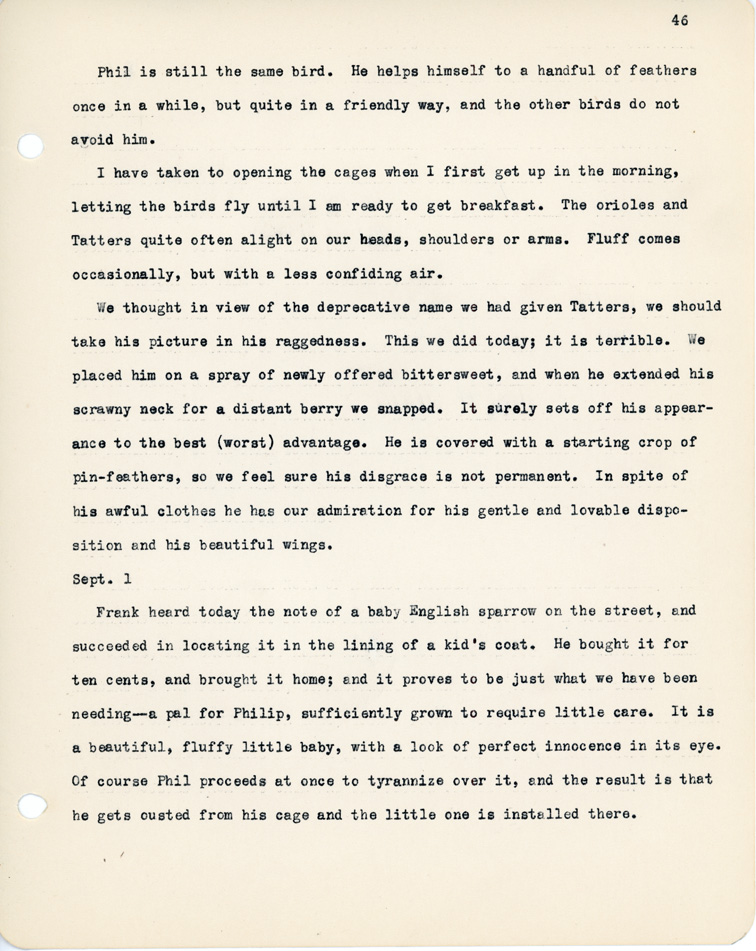
Phil is still the same bird. He helps himself to a handful of feathers once in a while, but quite in a friendly way, and the other birds do not avoid him.
I have taken to opening the cages when I first get up in the morning, letting the birds fly until I am ready to get breakfast. The orioles and Tatters quite on our heads, shoulders or arms. Fluff comes occasionally, but with a less confiding air.
We thought in view of the deprecative name we had given Tatters, we should take his picture in his raggedness. This we did today; it is terrible. We placed him on a spray of newly offered bittersweet, and when he extended his scrawny neck for a distant berry we snapped. It surely sets off his appearance to the best (worst) advantage. He is covered with a starting crop of pin-feathers, so we feel sure his disgrace is not permanent. In spite of his awful clothes he has our admiration for his gentle and lovable disposition and his beautiful wings.
Sept. 1
Frank heard today the note of a baby English sparrow on the street, and succeeded in locating it in the lining of a kid’s coat. He bought it for ten cents, and brought it home; and it proves to be just what we have been needing – a pal for Philip, sufficiently grown to require little care. It is a beautiful, fluffy little baby, with a look of perfect innocence in its eye. Of course Phil proceeds at once to tyrannize over it, and the result is that he gets ousted from his cage and the little one is installed there.
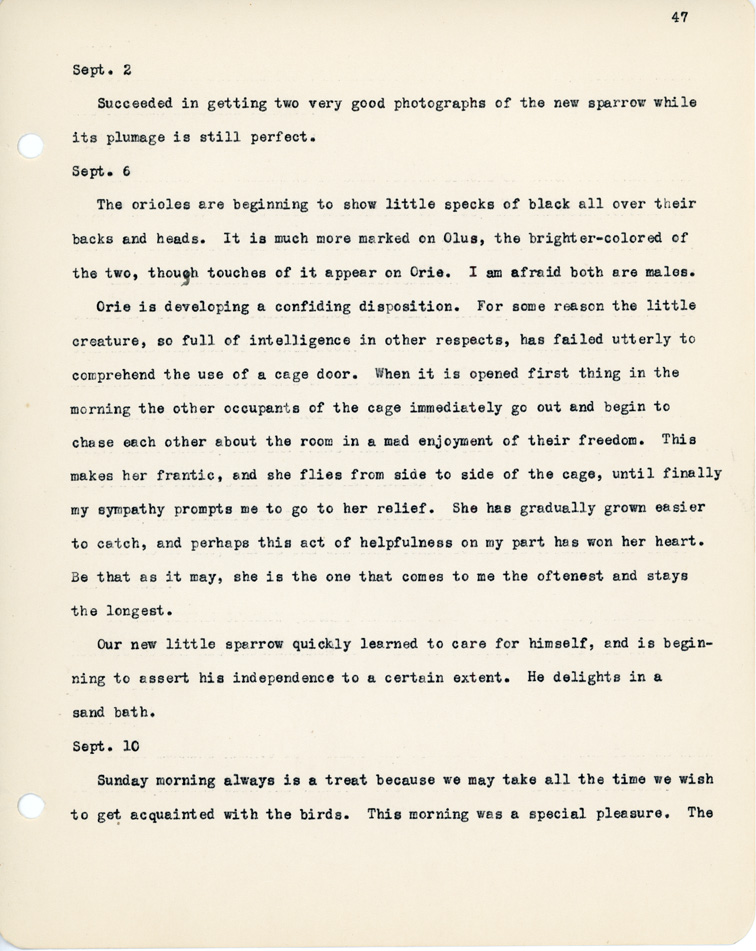
Sept. 2
Succeeded in getting two very good photographs of the new sparrow while its plumage is still perfect.
Sept. 6
The orioles are beginning to show little specks of black all over their backs and heads. It is much more marked on Olus, the brighter-colored of the two, though touches of it appear on Orie. I am afraid both are males.
Orie is developing a confiding disposition. For some reason the little creature, so full of intelligence in other respects, has failed utterly to comprehend the use off a cage door. When it is opened first thing in the morning the other occupants of the cage immediately go out and begin to chase each other about the room in a mad enjoyment of their freedom. This makes her frantic, and she flies from side to side of the cage, until finally my sympathy prompts me to go to her relief. She has gradually grown easier to catch, and perhaps this act of helpfulness on my part has won her heart. Be that as it may, she is the one that comes to me the oftenest and stays the longest.
Our new little sparrow quickly learned to care for himself, and is beginning to assert his independence to a certain extent. He delights in a sand bath.
Sept. 10
Sunday morning always is a treat because we may take all the time we wish to get acquainted with the birds. This morning was a special pleasure. The
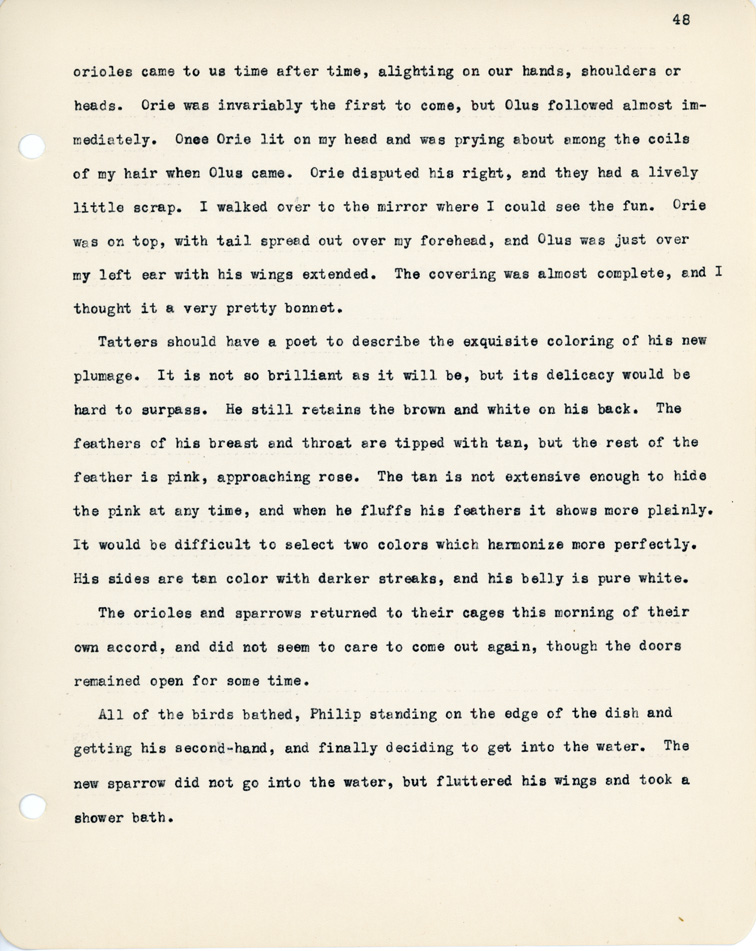
orioles came to us time after time, alighting on our hands, shoulders or heads. Orie was invariably the first to come, but Olus followed almost immediately. Once Orie lit on my head and was prying about among the coils of my hair when Olus came. Orie disputed his right, and they had a lively little scrap. I walked over to the mirror where I could see the fun. Orie was on top, with tail spread out over my forehead, and Olus was just over my left ear with his wings extended. The covering was almost complete, and I thought it a very pretty bonnet.
Tatters should have poet to describe the exquisite coloring of his new plumage. It is not so brilliant as it will be, but its delicacy would be hard to surpass. He still retains the brown and white on his back. The feathers of his breast and throat are tipped with tan, but rest of the feather is pink approaching rose. The tan is not extensive enough to hide the pink at any time, and when he fluffs his feathers it shows more plainly. It would be difficult to select two colors which harmonize more perfectly. His sides are tan color with darker streaks, and his belly is pure white.
The orioles and sparrows returned to their cages this morning of their own accord, and did not seem to care to come out again, though the doors remained open for some time.
All of the birds bathed, Philip standing on the dish and getting his second-hand, and finally deciding to get into the water. The new sparrow did not go into the water, but fluttered his wings and took a shower bath.
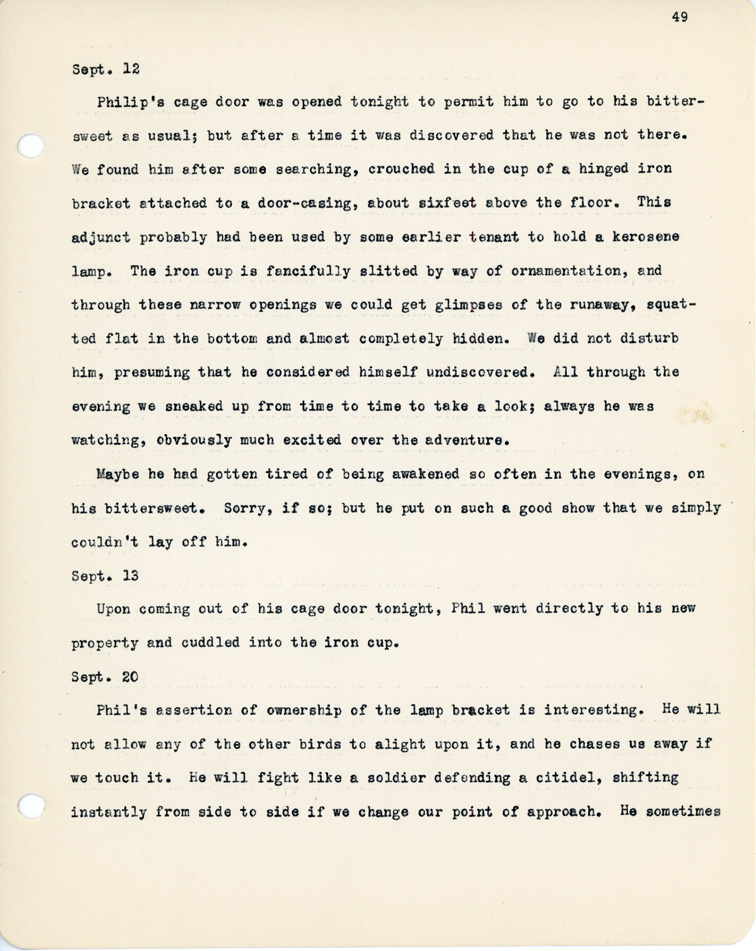
Sept. 12
Philip’s cage door was opened tonight to permit him to go to his bittersweet as usual; but after a time it was discovered that he was not there. We found him after some searching, crouched in the cup of a hinged iron bracket attached to a door-casing, about sixfeet [sic] above the floor. This adjunct probably had been used by some earlier tenant to hold a kerosene lamp. The iron cup fancifully slitted by way of ornamentation, and through these narrow openings we could get glimpses of the runaway, squatted flat in the bottom and almost completely hidden. We did not disturb him, presuming that he considered himself undiscovered. All through the evening we sneaked up from time to time to take a look; always he was watching, obviously much excited over adventure.
Maybe he had gotten tired of being awakened so often in the evenings, on his bittersweet. Sorry, if so; but he put on such a good show that we simply couldn’t lay off him.
Sept. 13
Upon coming out of his cage door tonight, Phil went directly to his new property and cuddled into the iron cup.
Sept. 20
Phil’s assertion of ownership of the lamp bracket is interesting. He will not allow any of the other birds to alight upon it, and he chases us away if we touch it. He will fight like a soldier defending a citidel [sic], shifting instantly from side to side if we change our point of approach. He sometimes
seizes a finger and nips so vigorously that the instinctive withdrawing of the hand pulls him clear out of his “nest”. Poor little Junior, the baby sparrow, want to cuddle down in that cozy place, but Phil chases him away. We though the cold iron would be uncomfortable for him, so we put a piece of flannel in the bottom; but he would not go near it until we removed the innovation. We then put some sand in the bottom, and were ourselves almost excited when he made no objection
Oct. 8
Poor Farm woods, 2 p. m. Clear and cool; some breeze.
bluejay field sparrow white-throated sparrow junco
flicker dove chickadee robin
hairy woodpecker Carolina nuthatch fox sparrow goldfinch
red-eyed towhee Harris’ sparrow ruby-crowned kinglet
Oct. 14
We made the discovery today that our birds are very fat. We had noticed that the grosbeaks seemed heavy in their movements, but had supposed it to be natural increase in weight; but as they moulted we could see that the bare places were just rolls of fat. Even the orioles share in the condition. I have let them all have what hemp seed they wanted, and the orioles, being unable to crack the seeds, have perched by seed-cup when the grosbeaks were eating, and have picked up the crumbs, or even whole seeds cleared of their weight. The grosbeaks generally run along the floor, instead of venturing flight.
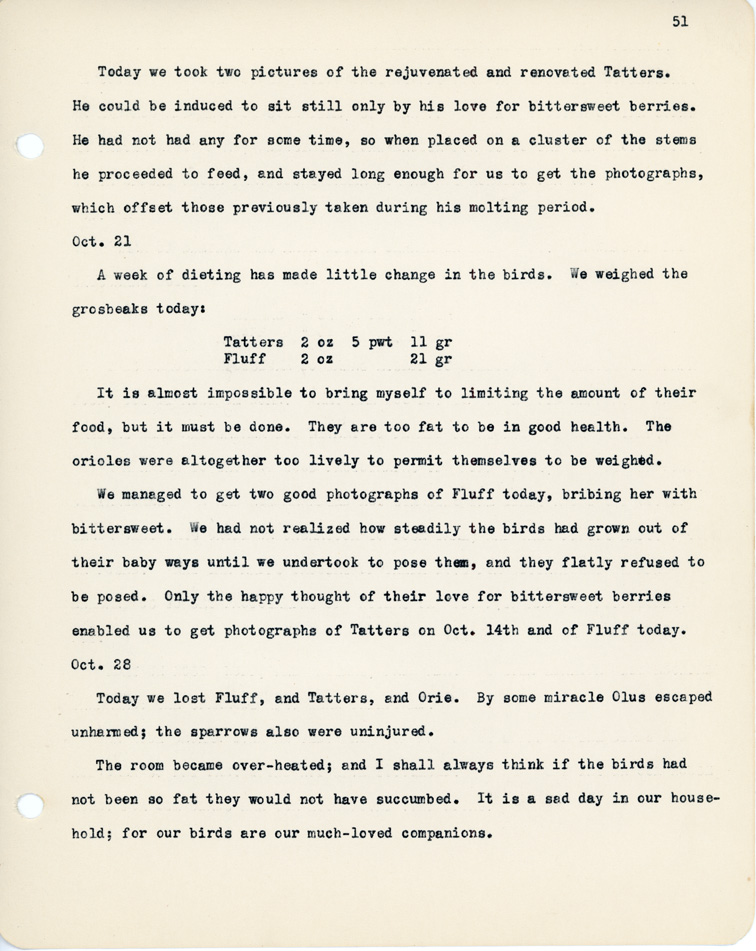
Today we took two pictures of the rejuvenated and renovated Tatters. He could be induced to sit still only by his love for bittersweet berries. He had not had any for some time, so when placed on a cluster of the stems he proceeded to feed, and stayed long enough for us to get the photographs, which offset those previously taken during his molting period.
Oct. 21
A week of dieting has made little change in the birds. We weighed the grosbeaks today:
Tatters 2 oz 5 pwt 11 gr
Fluff 2 oz 21 gr
It is almost impossible to bring myself to limiting the amount of their food, but it must be done. They are too fat to be in good health. The orioles were altogether too lively to permit themselves to be weighed.
We managed to get two good photographs of Fluff today, bribing her with bittersweet. We had not realized how steadily the birds had grown out of their baby ways until we under took to pose them, and they flatly refused to be posed. Only the happy thought of their love for bittersweet berries enabled us to get phtographs of Tatters on Oct. 14th and of Fluff today.
Oct. 28
Today we lost Fluff, and Tatters, and Orie. By some miracle Olus escaped unharmed; the sparrows also were uninjured.
The room became over-heated; and I shall always think if the birds had not been so fat they would not have succumbed. It is a sad day in our household; for our birds are our much-loved companions.
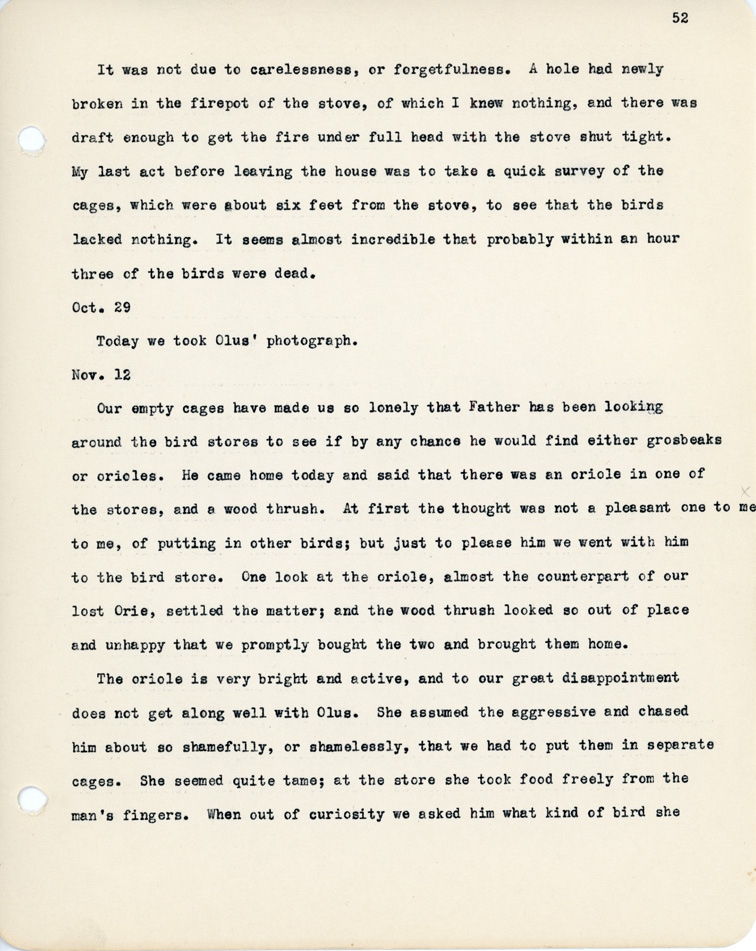
It was not due to carelessness, or forgetfulness. A hole had newly broken in the firepot of the stove, of which I knew nothing, and there was draft enough to get the fire under full head with the stove shut tight. My last act before leaving the house was to take a quick survey of the cages, which were about six feet from the stove, to see that the birds lacked nothing. It seems almost incredible that probably within an hour three of the birds were dead.
Oct. 29
Today we took Olus’ photograph.
Nov. 12
Our empty cages have made us so lonely that Father has been looking around the bird stores to see if by any chance he would find either grosbeaks or orioles. He came home today and said that there was an oriole in one of the stores, and a wood thrush. At first the thought was not pleasant one to me to me [sic], of putting in other birds; but just to please him we went with him to the bird store. One look at the oriole, almost the counterpart of our lost Orie, settled the matter; and the wood thrush looked so out of place and unhappy that we promptly bought the two and brought them home.
The oriole is very bright and active, and to our great disappointment does not get along well with Olus. She assumed the aggressive and chased him about so shamefully, or shamelessly, that we had to put them in separate cages. She seemed quite tame; at the store she took food freely from the man’s fingers. When out of curiosity we asked him what kind of bird she
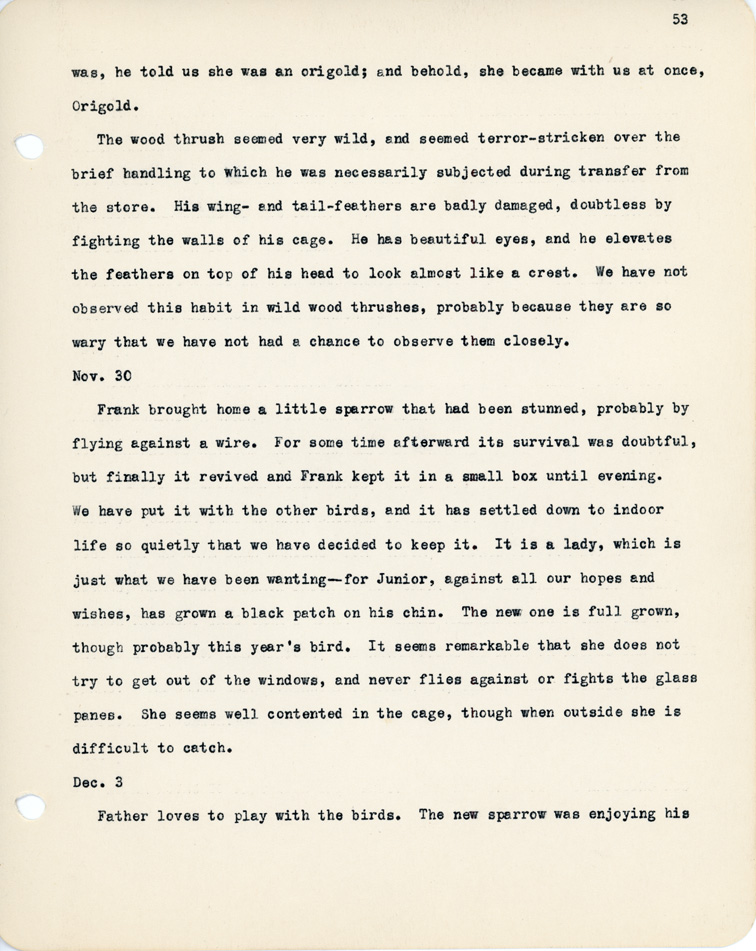
was, he told us she was an origold; and behold, she became with us at once, Origold.
The wood thrush seemed very wild, and seemed terror-stricken over the brief handling to which he was necessarily subjected during transfer from the store. His wing- and tail-feathers are badly damaged, doubtless by fighting the walls of his cage. He has beautiful eyes, and he elevates the feathers on top of his head to look almost like a crest. We have not observed this habit in wild wood thrushes, probably because they are so wary that we have not had a chance to observe them closely.
Nov. 30
Frank brought home a little sparrow that had been stunned, probably by flying against a wire. For some time afterward its survival was doubtful, but finally it revived and Frank kept it in a small box until evening. We have put it with the other birds, and it has settled down to indoor life so quietly that we have decided to keep it. It is a lady, which is just what we have been wanting – for Junior, against all our hopes and wishes, has grown a black patch on his chin. The new one is full grown, though probably this year’s bird. It seems remarkable that she does not try to get out of the windows, and never flies against or fights the glass panes. She seems well contented in the cage, though when outside she is difficult to catch.
Dec. 3
Father loves to play with the birds. The new sparrow was enjoying his

attentions today when he ventured to quote scripture to it: “Not even a sparrow falleth to the ground–” – he got that far when, with the lovely impoliteness, I corrected:
“Not ‘not even a sparrow’; ‘not a sparrow’, Daddy,” I proclaimed.
He gave me a look. “What a mess of negatives, Daughter! you [sic] should mind your rhetoric,” he said, his eyes twinkling.
We are opportunists, about names for our vermin high or low. “Not-even” is the lady’s designation; Not-even, a sparrow.
Not-even is still elusive of capture, but occasionally returns to and enters the cage of her own accord.
Dec. 7
The Wood Thrush
Distance lends glamour to the commonplace; which no doubt is why the bird-store man assured us that the wood thrush had been caught in Texas. So, not for the first time that it has chanced in recorded history, we condoned dubious geography by naming the bird Texas.
Texas was in a dilapidated state of plumage when we acquired him. All primaries and tail-feathers are broken off, and of course he is unable to take even the shortest flight. His body feathers are no damaged, and he seems to be in good health.
He is possessed of innate wildness. When taken in the hand he struggles frantically, not becoming quiet after a few moments as the other birds do. We have handled his thus only twice – once when put-
ting him into the cage, and once since. At first he was very suspicious of our every movement, but after two or three days he became more contented and quite, not getting frightened when I cleaned the cage or changed the food dishes. He will not come out of the cage of his own accord, even though the door stands open for a long time. I generally take him out after waiting for a time, having him in my hand for only a second or two. He seems to enjoy hopping about the floor, but soon returns to the cage at his own instance, entering it unless the door is closed.
About the third evening he began about dusk to utter notes which had the real wood thrush tone, increasing them in volume and growing very enthusiastic, reminding one of the intensity and wildness which our common robin, another member of the thrush tribe, puts into his notes as darkness descends.
His sleeping position is peculiar. Instead of cuddling down his feathers over his feet and settling on the perch as the other birds do, he stands up straight on one leg, the other tucked up out of sight among his feathers, his head settled among a fluff offeathers [sic] above the wing; the sleeping attitude commonly and incorrectly ascribed to a bird as “its head under its wing.” Having no tail at present, Texas asleep is veritably a ball of feathers. His sleep appears to be very sound; often we take the lamp and stand talking to him, not three feet distant, for some time before he brings his head out of its fluff.
When another bird gets too close to suit him he “snaps” his bill, making a definitely audible sound; he sometimes treats one of us the same way if startled. We have tried to see how he produces the sound; it does not seem to be by bringing the mandibles together, but in some manner as he opens his bill; however, its accomplishment is too swift for us to ascertain the means.
Although not at all aggressive, he stands his ground with the other birds. When they get too familiar, and snapping his bill does not drive them away, he has a very funny trick of opening his mouth wide, holding his head low and extending his neck. His mouth is bright yellow inside, and this starling bluff seems thus far quite enough to gain him the room he desires.
Knowing how wild he is, I was surprised to find, the first time he was released from the cage, that he would come willingly to take a mealworm from my fingers. It is true that he approached by many short advances, finally grabbing the worm and getting away as fast as he could go. He held it for a moment in his beak, then hammered it with a gulp. He has, indeed, a spasmodic way of eating and drinking. He goes to a dish and grabs a bite, which he swallows forthwith. He does the same with water, biting it rather than sipping it as the orioles do.
On Thanksgiving Day he ventured the first definite song we had heard, and kept it up for an hour. His song is sweet and low, consisting
mostly of trills. It is quite unlike the phrased song of the wild wood thrush as we know it, and the notes lack volume. Since them he has sung more or less every morning, usually quite early.
As the weather turned colder we moved the cages into the bay window in the dining room. This change of scenery seemed to cause Texas a marked uneasiness, which did not wear away for several days.
He likes cockroaches as well as meal-worms, and is quite deft at catching one when it is turned loose in his cage. For the best of reasons (which a later note will discuss) we loose the cockroaches one at a time, and keep an eye on it until it is eaten – or worse! He has a droll way of standing statuesque and looking perfectly innocent for five or ten seconds, after he has swallowed the roach or a worm. The other birds usually “smack” their bills and whet them elaborately after they have eaten anything.
Texas is much disturbed if another bird enters his cage for a visit, as they sometimes do when the door is left open.
Origold
The little oriole we found to be as fulsomely plump as our own birds were a while back, before our tragedy; we consider this very strange for a bird long habitant of a bird-store. We intend to get her down to a lesser weight, as we have succeeded in doing with Olus.
She is furnishing us a fine opportunity to compare her likes and dislikes with those of Olus. She has notions of her own as to what
is good to eat. Olus relishes graham bread, because he was partly raised on it; Origold will not touch it. She loves raisins; Olus will not eat them. Olus thinks cockroaches are find stuff, and comes with haste to the wires to get one; Origold tried one, and has scorned them ever since. At first she would not eat shreds of raw beef, but has learned to enjoy that food, while Origold eat them with relish.
They agree in liking mealworms, but Origold is much more eager for them than Olus. She learned in a single day to recognize the small tin pail in which we keep the worms, and when she sees one of us approaching the cage with it she fairly dances.
Her bill is of a bluish color, as the bills of our baby orioles were at first. Her upper mandible is noticeably longer than the lower, and she picks things up sidewise when they are very small. Olus’ bill is black.
When we first got her, she flew against the wall and the furniture when let out of the cage’ but she quickly learned to avoid objects. In flying to a perch, such as the back of a chair, she was very awkward, often missing the mark; but this too she soon corrected. She now is as graceful and nimble as Olus. Probably her lack of sensing bulk, and her inaccuracy in perching, were due to long confinement in a cage.
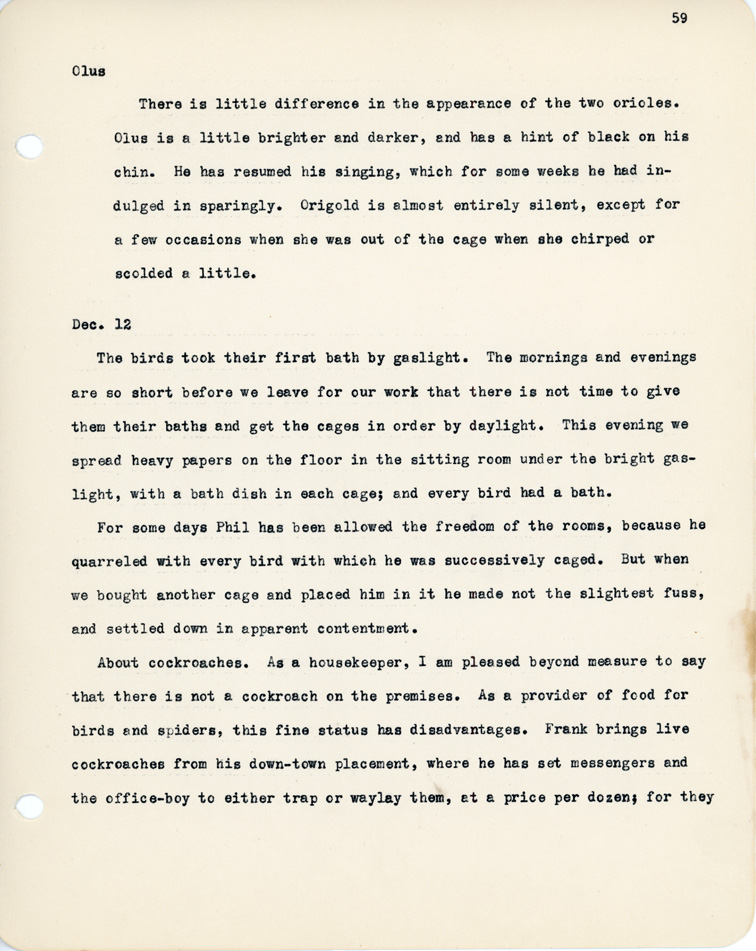
Olus
There is little difference in the appearance of the tow orioles. Olus is a little brighter and darker, and has a hint of black on his chin. He has resumed his singing, which for some weeks he had indulged in sparingly. Origold is almost entirely silent, except for a few occasions when she was out of the cage when she chirped or scolded a little.
Dec. 12
The birds took their first bath by gaslight. The mornings and evenings are so short before we leave for our work that there is not time to give them their baths and get the cages in order by daylight. This evening we spread heavy papers on the floor in the sitting room under the bright gaslight, with a bath dish in each cage; and every bird had a bath.
For some days Phil has been allowed the freedom of the rooms, because he quarreled with every bird with which he was successively caged. But when we bought another cage and placed him in it he made not the slightest fuss, and settled down in apparent contentment.
About cockroaches. As a housekeeper, I am pleased beyond measure to say that there is not a cockroach on the premises. As a provider of food for birds and spiders, this fine status has disadvantages. Frank brings live cockroaches from his down-town placement, where he has set messengers and the office-boy to either trap or waylay them, at a price per dozen; for they
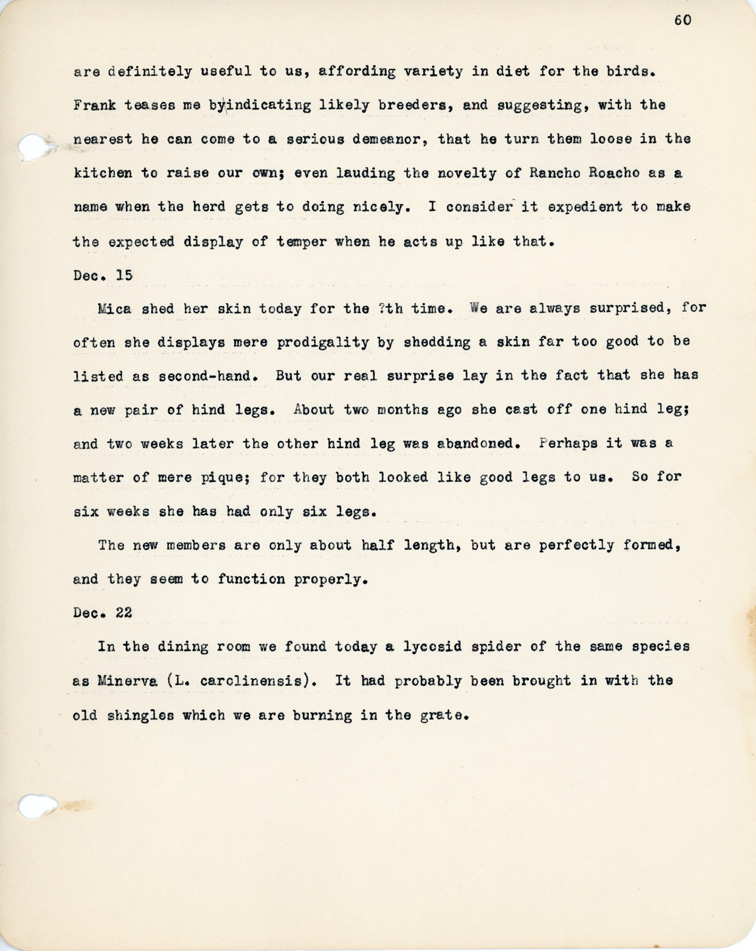
are definitely useful to us, affording variety in diet for the birds. Frank teases me by indicating likely breeders, and suggesting, with the nearest he can come to a serious demeanor, that he turn them loose in the kitchen to raise our own; even lauding the novelty of Rancho Roacho as a name when the herd gets to doing nicely. I consider it expedient to make the expected display of temper when he acts up like that.
Dec. 15
Mica shed her skin today for the ?th time. We are always surprised, for often she displays mere prodigality by shedding a skin far too good to be listed as second-hand. But our real surprise lay in the fact that she has a new pair of hind legs. About two months ago she cast off one hind leg; and two weeks later the other hind leg was abandoned. Perhaps it was a matter of mere pique; for they both looked like good legs to us. So for six weeks she has had only six legs.
The new members are only about half length, but are perfectly formed, and they seem to function properly.
Dec. 22
In the dining room we found today a lycosid spider of the same species as Minerva (L. carolinensis). It had probably been brought in with the old shingles which we are burning in the grate.
